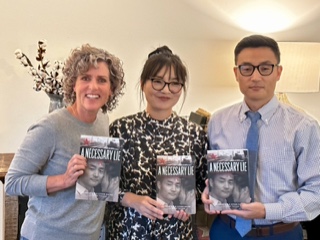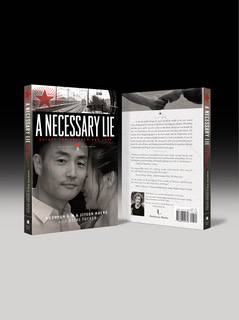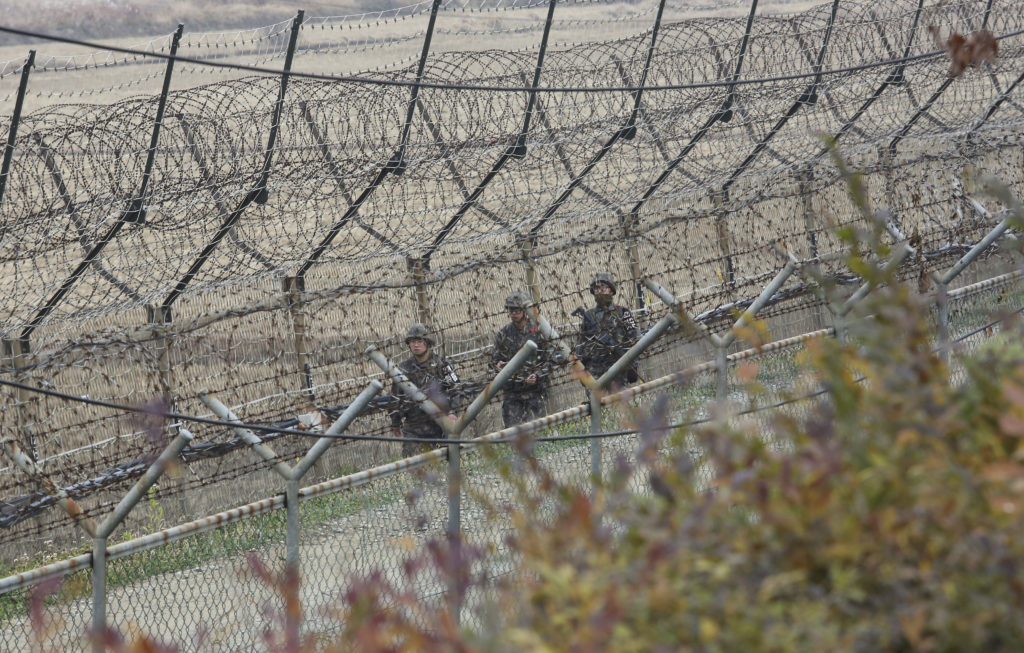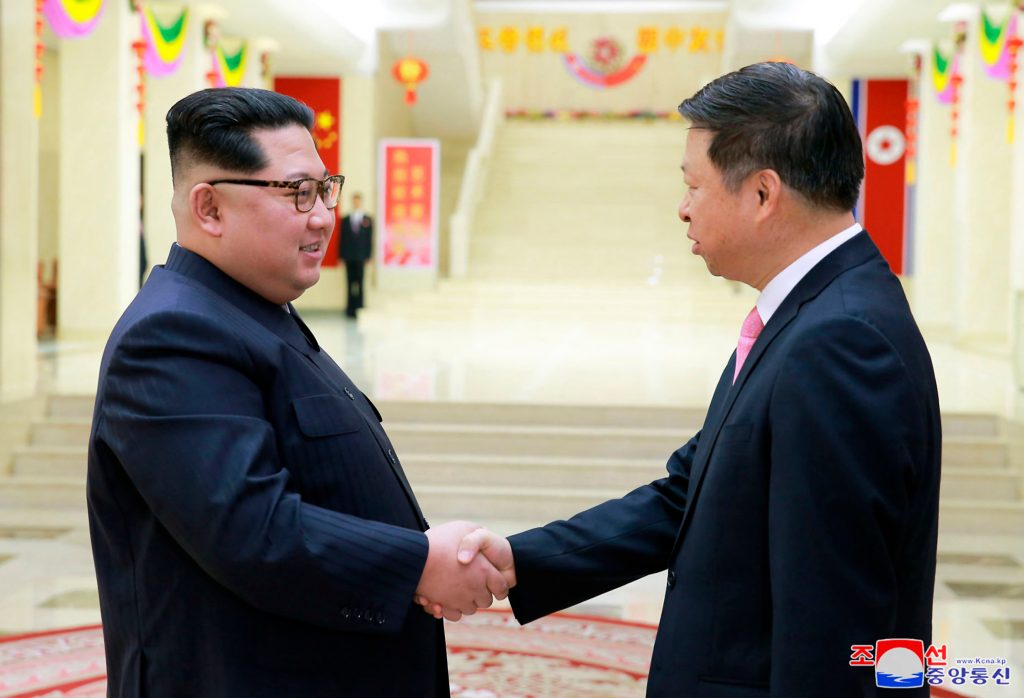
She thought he was going away on business. He knew he would be leaving North Korea.
His lie, told to protect his wife from political retribution, is the basis of his new biography “A Necessary Lie” — the love story of Doohyun Kim and Jiyeon Maeng as they escaped North Korea.
Kim and Maeng are North Korean defectors who immigrated to Utah and lived with a BYU Korean professor. After five years, they have decided to release their story of escape with author Heidi Tucker.
Tucker spent two years on the biography, working with the Kims to share their lives in North Korea — from fond playground memories to the pain of having to escape without each other.
From the day Doohyun left the train station, it took him nearly two years to bring his wife to South Korea. Since immigrating to America in 2015, they have had two boys. Both Heidi Tucker and the Kims consider this book an essential tool to educate their children about life in North Korea.
“I was able to tell this story for their children,” Tucker said. “This escape was for the next generation. I’ve got to tell this story for the next generation.”
Not just Doohyun and Jiyeon’s children will be affected by this book. Heidi Tucker said she believes this biography has the capacity to change lives.

“I think three things can happen when you read this book,” Tucker said. “Number one, you are going to learn what it is like to live inside the barbed wire fences of North Korea. Secondly, you will have a greater appreciation for those who escape and a true empathy for those who remain there. Not everyone can escape. Thirdly, it’s a greater sense of gratitude.”
For Doohyun and Jiyeon, this book has the ability to increase empathy and understanding for the North Korean people.
“I want to tell people to think differently about the North Korean Regime and North Korean People,” Doohyun said. “Many people don’t believe that North Korean people love each other. I want to tell outside people that there are people there living like us. They love each other. There are people who risk their lives for love.”
BYU history professor and modern East Asian international relations specialist Kirk Larsen agreed that humanizing North Koreans is important to understanding and connecting with them.
“Don’t forget the humanity of North Koreans,” Larsen said. “They are people. They don’t feel any less than other people do.”
“A Necessary Lie” breaks down the Kim’s journey from childhood to adulthood, explaining the current state of North Korea while opening the conversation to humanity, empathy and love in each step of the journey.
The decision to leave
Although life in North Korea is characterized by a lack of freedom, Tucker said, the decision to leave is a complicated combination of many factors.
“(The most important reason Doohyun left) is his family background,” Jiyeon said. “His dad died in prison camp for saying human rights to government.”
Doohyun’s father wrote 20 pages of handwritten complaints on human rights violations. He was taken away by the government soon after, Doohyun explained.
“I became a son of traitor,” Doohyn said. “I was discriminated by North Korean government. Everywhere I went, I couldn’t get a good job. I decided I would rather die in the pursuit of freedom.”
In 2009, Kim Jong-Un appeared in public. His presence was another factor in Doohyun’s decision to leave.

“We realized that he was going to be our next leader as the third generation of dictatorship,” Doohyun said. “I realized there is no hope for the rest of my life. It doesn’t make sense at all. Who is Kim Jong-Un? What did he do for the country? We had been suffering enough.”
Doohyun decided he needed to leave North Korea, but he also had to travel alone.
“You cannot bring your wife,” Tucker said. “Couples never succeed. You’ve got to be on your own. You will be noticed. You need to go first and then send back.”
Doohyun said he had little hope of seeing his wife again after his escape.
“There is only two ways (to leave),” he said. “One, is I’m going to die. If I am still alive, I must meet my wife again. I just decided if I am not going to die, I must meet my wife again.”
The long journey
Despite the close proximity between North and South Korea, the escape route is complicated due to the presence of the De-Militarized Zone.

Larsen explained that the DMZ is nearly impossible to cross due to the trenches, fences, landmines and soldiers.
“Contrary to the name, the De-Militarized Zone is one of the most militarized places on earth,” Larsen said. “Defectors have to go north. There have been attempts to harden that border as well, but it’s not nearly as fortified.”
The border between North and South Korea is just two miles, but the journey from North Korea to China to Laos to Thailand is 3,000 miles, Tucker said.
To go north, defectors often utilize a brokerage system, according to Larsen. North Koreans pay these brokers to bribe key officials and escape into China.
In the past, China served as a stopping point for political refugees to receive asylum and new documentation, Larsen continued. New policies by the People’s Republic of China make this impossible for North Korean refugees.
“They have put fences around all the embassies in Beijing,” Larsen said. “You can’t get there. That is why you have to go to a third country.”
In fact, China now classifies North Korean refugees as economic migrants and will send defectors back to North Korea, where refugees are often killed or imprisoned in labor camps, Larsen said.

“What North Korea has, as far as we can tell, and a lot of this is based off of defector testimony, a second set of camps where the purpose is not to make you serve your sentence,” Larsen said. “The purpose is to keep you there forever and kill you. Death camps.”
This makes the border crossing from North Korea to China very stressful for migrants, Jiyeon explained.
“In China you are still dangerous, it is not comfort,” Jiyeon said. “At any time if you are caught and arrested by Chinese people or North Korean people, you get sent back to North Korea immediately and will live in concentration camps for the rest of your life or be killed.”
Brokers only pay the officials to look the other way, Tucker said, migrants are still responsible for getting across the border.
“You are on your feet,” Tucker said. “It is up to you to run through territory and climb through barbed wire fence.”
The arrival in South Korea
When Doohyun arrived in Thailand, he was issued a new passport and allowed to go to South Korea. There, he worked to earn money to send brokers to his wife Jiyeon and bring her across the border as well.
“Once they leave North Korea, they can now be issued a passport,” Tucker said. “They can go anywhere in the world except North Korea. They can never go back to North Korea. That’s instant execution.”
This inability to go home causes isolation and loneliness, especially as defectors learn to adapt to a capitalist culture, Tucker said.
“They have to learn to turn on a computer,” Tucker said. “They have to learn how to type.”
This combination of loneliness and non-familiarity with South Korean culture leads to many adverse effects in defector communities, Larsen explained.
“Defector communities in South Korea have much higher than average rates of suicide, alcoholism, unemployment and depression,” Larsen said.
The aftermath
The love story between Doohyun and Jiyeon was key to their escape.
Speaking of Jiyeon, Doohyun said, “She risked her life for love. There is only one reason she escaped — for love. She was brainwashed very strongly, so she didn’t think that this country was something wrong.”
Although reliving their experience was difficult, they said they have a mission to tell the truth.
“When we recall our past, it is hard to remind myself again,” Doohyun said. “There are difficult things I don’t want to recall again. On the other hand, I feel we have a mission to tell the truth of their lives to the world. People should know what is going on inside North Korea.”
Overall, author Heidi Tucker said she believes the novel is focused on gratitude. The Kim’s story left her with a deeper appreciation for her own freedom and blessings.
“I want people to feel grateful for what they have,” Jiyeon said.
“A Necessary Lie” was published in Sept. 2023. To buy the book, visit Heidi Tucker’s website.




